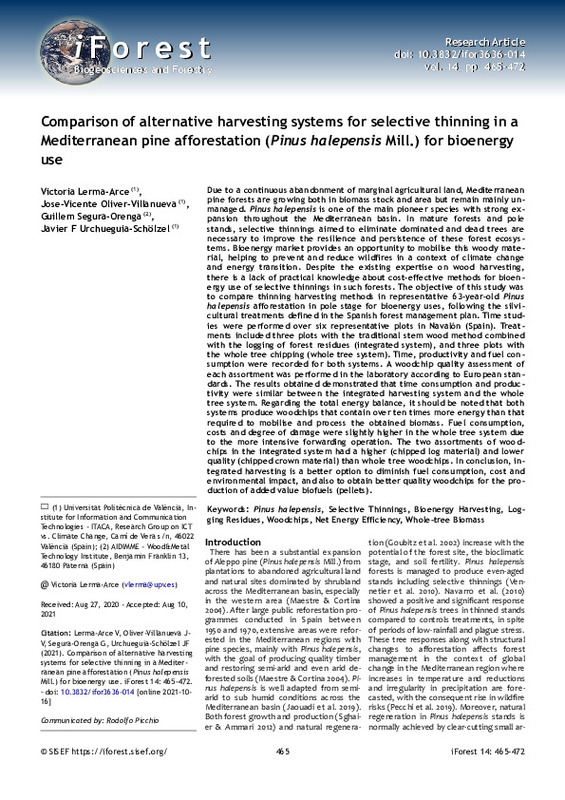JavaScript is disabled for your browser. Some features of this site may not work without it.
Buscar en RiuNet
Listar
Mi cuenta
Estadísticas
Ayuda RiuNet
Admin. UPV
Comparison of alternative harvesting systems for selective thinning in a Mediterranean pine afforestation (Pinus halepensis Mill.) for bioenergy use
Mostrar el registro sencillo del ítem
Ficheros en el ítem
| dc.contributor.author | LERMA ARCE, VICTORIA
|
es_ES |
| dc.contributor.author | Oliver Villanueva, José Vicente
|
es_ES |
| dc.contributor.author | Segura-Orenga, Guillem
|
es_ES |
| dc.contributor.author | Urchueguía Schölzel, Javier Fermín
|
es_ES |
| dc.date.accessioned | 2022-11-16T19:01:15Z | |
| dc.date.available | 2022-11-16T19:01:15Z | |
| dc.date.issued | 2021-10 | es_ES |
| dc.identifier.uri | http://hdl.handle.net/10251/189821 | |
| dc.description.abstract | [EN] Due to a continuous abandonment of marginal agricultural land, Mediterranean pine forests are growing both in biomass stock and area but remain mainly unmanaged. Pinus halepensis is one of the main pioneer species with strong expansion throughout the Mediterranean basin. In mature forests and pole stands, selective thinnings aimed to eliminate dominated and dead trees are necessary to improve the resilience and persistence of these forest ecosystems. Bioenergy market provides an opportunity to mobilise this woody material, helping to prevent and reduce wildfires in a context of climate change and energy transition. Despite the existing expertise on wood harvesting, there is a lack of practical knowledge about cost-effective methods for bioenergy use of selective thinnings in such forests. The objective of this study was to compare thinning harvesting methods in representative 63-year-old Pinus halepensis afforestation in pole stage for bioenergy uses, following the silvicultural treatments defined in the Spanish forest management plan. Time studies were performed over six representative plots in Navalon (Spain). Treatments included three plots with the traditional stem wood method combined with the logging of forest residues (integrated system), and three plots with the whole tree chipping (whole tree system). Time, productivity and fuel consumption were recorded for both systems. A woodchip quality assessment of each assortment was performed in the laboratory according to European standards. The results obtained demonstrated that time consumption and productivity were similar between the integrated harvesting system and the whole tree system. Regarding the total energy balance, it should be noted that both systems produce woodchips that contain over ten times more energy than that required to mobilise and process the obtained biomass. Fuel consumption, costs and degree of damage were slightly higher in the whole tree system due to the more intensive forwarding operation. The two assortments of woodchips in the integrated system had a higher (chipped log material) and lower quality (chipped crown material) than whole tree woodchips. In conclusion, integrated harvesting is a better option to diminish fuel consumption, cost and environmental impact, and also to obtain better quality woodchips for the production of added value biofuels (pellets). | es_ES |
| dc.description.sponsorship | VLA and JVOV conceived the study and draft the manuscript; VLA carried out the field measurements; VLA and GSO carried out the biomass tests in the laboratory; VLA, JVOV and JFUS performed the statistical analysis. This work was partially funded by the Government of Valencia (IVACE, Spain) in the framework of the BIOPELLET project. The authors want to acknowledge the support of the forest company Moixent Forestal, the Municipality of Enguera and the AIDIMME Technology Institute and very especially the support of Dr. Raffaele Spinelli for providing methodological support inthe frame of COST Action FP0902. Finally, a special thank to the reviewers who improved and enriched the publication with their valuable contributions. | es_ES |
| dc.language | Inglés | es_ES |
| dc.publisher | SISEF | es_ES |
| dc.relation.ispartof | iForest - Biogeosciences and Forestry | es_ES |
| dc.rights | Reconocimiento - No comercial (by-nc) | es_ES |
| dc.subject | Pinus halepensis | es_ES |
| dc.subject | Selective thinnings | es_ES |
| dc.subject | Bioenergy harvesting | es_ES |
| dc.subject | Logging residues | es_ES |
| dc.subject | Woodchips | es_ES |
| dc.subject | Net energy efficiency | es_ES |
| dc.subject | Whole-tree biomass | es_ES |
| dc.subject.classification | PROYECTOS DE INGENIERIA | es_ES |
| dc.subject.classification | INGENIERIA AGROFORESTAL | es_ES |
| dc.subject.classification | FISICA APLICADA | es_ES |
| dc.title | Comparison of alternative harvesting systems for selective thinning in a Mediterranean pine afforestation (Pinus halepensis Mill.) for bioenergy use | es_ES |
| dc.type | Artículo | es_ES |
| dc.identifier.doi | 10.3832/ifor3636-014 | es_ES |
| dc.relation.projectID | info:eu-repo/grantAgreement/COST//FP0902//COST Action/ | es_ES |
| dc.rights.accessRights | Abierto | es_ES |
| dc.contributor.affiliation | Universitat Politècnica de València. Escuela Técnica Superior de Ingeniería Agronómica y del Medio Natural - Escola Tècnica Superior d'Enginyeria Agronòmica i del Medi Natural | es_ES |
| dc.contributor.affiliation | Universitat Politècnica de València. Escuela Técnica Superior de Ingenieros Industriales - Escola Tècnica Superior d'Enginyers Industrials | es_ES |
| dc.description.bibliographicCitation | Lerma Arce, V.; Oliver Villanueva, JV.; Segura-Orenga, G.; Urchueguía Schölzel, JF. (2021). Comparison of alternative harvesting systems for selective thinning in a Mediterranean pine afforestation (Pinus halepensis Mill.) for bioenergy use. iForest - Biogeosciences and Forestry. 14:465-472. https://doi.org/10.3832/ifor3636-014 | es_ES |
| dc.description.accrualMethod | S | es_ES |
| dc.relation.publisherversion | https://doi.org/10.3832/ifor3636-014 | es_ES |
| dc.description.upvformatpinicio | 465 | es_ES |
| dc.description.upvformatpfin | 472 | es_ES |
| dc.type.version | info:eu-repo/semantics/publishedVersion | es_ES |
| dc.description.volume | 14 | es_ES |
| dc.identifier.eissn | 1971-7458 | es_ES |
| dc.relation.pasarela | S\447834 | es_ES |
| dc.contributor.funder | European Cooperation in Science and Technology | es_ES |
| dc.contributor.funder | Institut Valencià de Competitivitat Empresarial | es_ES |
| dc.subject.ods | 15.- Proteger, restaurar y promover la utilización sostenible de los ecosistemas terrestres, gestionar de manera sostenible los bosques, combatir la desertificación y detener y revertir la degradación de la tierra, y frenar la pérdida de diversidad biológica | es_ES |








